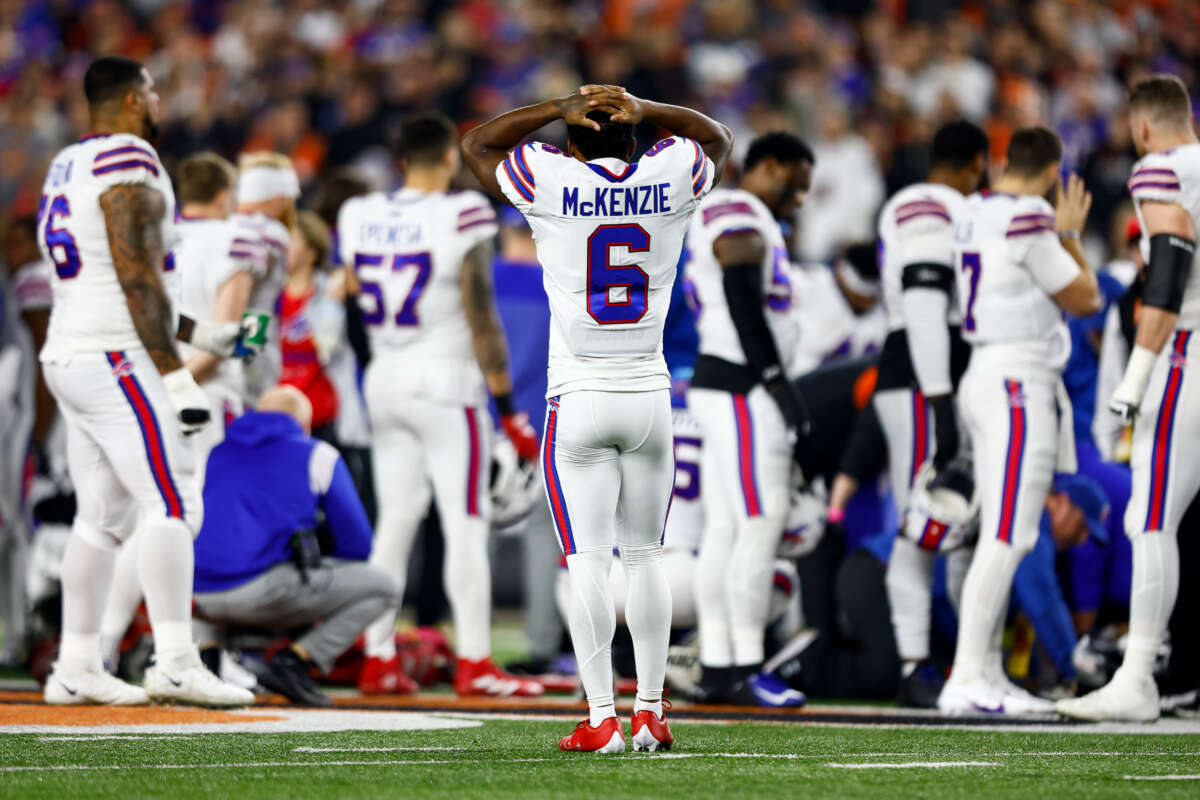Damar Hamlin, a 24-year-old safety in his second season with the Buffalo Bills, is in critical condition after going into cardiac arrest during a Monday night game with the Cincinnati Bengals.
After tackling wide receiver Tee Higgins, Hamlin took two steps and collapsed backward. Medical personnel immediately rushed to his side, administering CPR and giving him oxygen as he lay motionless on the ground. Hamlin was then strapped to a stretcher and carted off the field in an ambulance.
Commentators were at a loss for words, and went to commercial break several times during the 10 to 15 minutes that Hamlin received medical attention. Several players from both teams were visibly upset, with many crying and praying on the field as medical care was being administered.
It appears that players were initially told they would have five minutes in the locker room before resuming the game, but after coaches from both teams conferred with officials, it was agreed that the game should be suspended indefinitely. About an hour later, the NFL announced that the game would be postponed.
NFL vice president of football operations Troy Vincent disputed the claim that play was going to resume five minutes after Hamlin was driven off the field, even though it appeared on screen that players had been told to warm up after Hamlin was carted away, with Bengals quarterback Joe Burrow throwing footballs to his teammates during that time.
“Neither coach was talking about resuming play, the players were not thinking of resuming play,” Vincent said. “How do you resume play after seeing such a traumatic event?”
A statement from the Bills on Tuesday morning said that Hamlin’s heart had stopped but was restored by medical professionals on the field. He is now sedated and in critical condition at the University of Cincinnati Medical Center.
Jordan Rooney, Hamlin’s friend and marketing representative, tweeted earlier in the evening that Hamlin’s vitals had returned “to normal.”
Teams and players tweeted well wishes for Hamlin and expressed shock at the incident.
Many commentators urged the NFL to consider reforms in the wake of Hamlin’s injury and other worrisome injuries that took place earlier this season.
After explaining a number of scenarios that could have led to Hamlin collapsing on the field, ER physician and social media personality Jeremy Faust said that changes to the sport needed to be discussed. “The worst fears are being confronted, and this must trigger reform,” he said.
Some social media users, including political columnist Skip Bayless, questioned how the game could be resumed this late in the season. Nina Turner, a progressive former Ohio state lawmaker, condemned Bayless’s tweet, suggesting that it showcased the way sports leagues exploit athletes, particularly players of color.
“This goes to show how some dehumanize professional athletes, especially Black athletes,” Turner wrote on Twitter. “These athletes are people with families. They are people, not bodies meant for entertainment.”
In an op-ed for Truthout in October, journalist Harvey Wasserman, who once played football as a wide receiver, pointed to other serious injuries this season, arguing that changes to the sport were desperately needed. When Miami Dolphins quarterback Tua Tagovailoa collapsed on the field earlier in the season after sustaining a hard hit to his head, for example, the team initially told the public he had undergone a “back injury.” Tagovailoa was allowed to play the following week, only to sustain yet another head injury.
While quarterbacks are especially in need of protection, players in all positions are at risk of severe injury, Wasserman noted.
“For all the focus on rules surrounding quarterbacks, the essence of the game at all positions remains embedded in its violence, with the expectation of injury being virtually universal,” he wrote.
Replacing tackling with the use of flags “may be the game’s only hope,” he went on, adding:
The violence lovers will whine that the sport is going “wimpy.” But in the long term, the whole game must be overhauled and made less brutal. The grotesque parade of seriously harmed young stars being carted off the field is not sustainable.
Join us in defending the truth before it’s too late
The future of independent journalism is uncertain, and the consequences of losing it are too grave to ignore. To ensure Truthout remains safe, strong, and free, we need to raise $24,000 by the end of today. Every dollar raised goes directly toward the costs of producing news you can trust.
Please give what you can — because by supporting us with a tax-deductible donation, you’re not just preserving a source of news, you’re helping to safeguard what’s left of our democracy.
